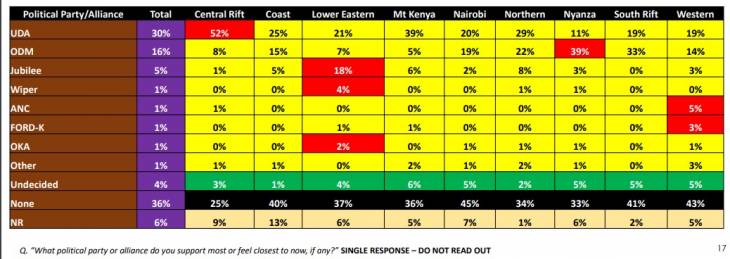UDA beats ODM and emerges as the most preferred political party in new study
By collins.osanya, November 19, 2021
The United Democratic Alliance (UDA) has emerged as the most popular political party in Kenya, a recent study has revealed.
According to a survey conducted by the Trends and Insights For Africa (TIFA), UDA turned out to be the most popular party in the country with a popularity of 30%.
“As of now, no political party or alliance/coalition attracts the support of more than just under one-third of Kenyans, with nearly half (40%) saying they “feel close to” or “support” no such entity. However, the most popular party is the newest: UDA. Its popularity (30%) is greater than that of Orange Democratic Movement (ODM) and Jubilee combined (21%),” the report of the survey read in part.
TIFA said the study was conducted between November 7 and 13 this year at a time when most media coverage has been on the unfolding 2022 election scenario, “with almost incessant meetings, pronouncements, and public rallies, especially by the two most prominent likely candidates, DP William Ruto and former Prime Minister Raila Odinga, even if the latter has not yet formally announced his candidacy (which has been planned for December 9).”
Closely following UDA is Raila’s ODM (16%), Jubilee (5%) as Amani National Coalition (ANC), WIPER, One Kenya Alliance (OKA), FORD Kenya and others tied at (1%).

“Given the period remaining until the next election and with considerable uncertainty regarding possible mergers/coalitions and the determination of the ballot-’menu’ for all elective positions (starting with the presidency), no assumptions can be made now as to what these figures will be by mid-2022,” TIFA further added.
The survey further pointed out that aside from UDA, the support for other political parties is quite highly concentrated in particular regions.
“For example, ODM is nearly twice as popular in Nyanza (39%) as it is anywhere else aside from South Rift (33%), and the same applies to Jubilee which is most popular in Lower Eastern (18%). At the same time, the proportion of those not associating themselves with any party is substantial nearly the same across all regions (ranging from 25% in Central Rift to 45% in Nairobi),” the study said.